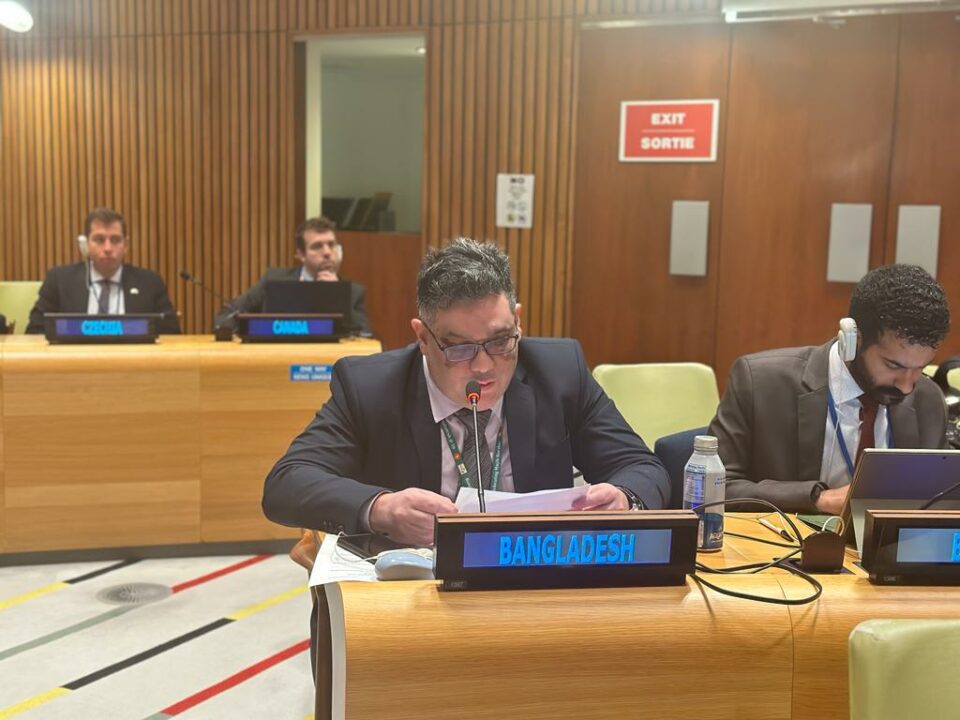Mr. Chair,
We warmly congratulate you and other members of the Bureau on your well-deserved election. Bangladesh aligns itself with the statements of the OIC and the NAM under this crucial agenda item.
Mr. Chair
Under the dynamic leadership of Hon’ble Prime Minister Sheikh Hasina, Bangladesh maintains a stringent policy of ‘zero tolerance’ towards terrorism and violent extremism in its all forms and manifestation including state sponsored terrorism.
At the national level, we have put in place comprehensive laws, namely, the ‘Anti-Terrorism Act’ and the ‘Money Laundering Prevention Act’. We are also in the process of drafting the country’s first National Counter Terrorism Strategy in line with the UN Global Counter Terrorism Strategy. Our government has made it clear that our territory would not be allowed to be used by any operatives to incite or cause terrorist acts or harm to our neighbors.
Mr. Chair,
We are now halfway through our journey towards the implementation of SDGs and UN members are working actively to formulate the post-2030 development blueprint. However, we must acknowledge that all our development efforts may be in vain if we cannot effectively combat terrorism and violent extremism. Given that these threats transcend borders, it is imperative that we stand together to eliminate this menace. Allow me to highlight a few key points in this regard:
First, The UN should lead and steer the global discourse and action in a more robust and coordinated manner, taking into account the local context and the needs of Member States; and in close coordination with national government and relevant stakeholders. Furthermore, as the apex global norm setting body, we wish to see the UN making definitive progress in the work of developing a comprehensive convention on terrorism.
Second, we welcome the adoption of the 8th Review of the Global Counter-Terrorism Strategy which came up with numerous vital courses of action to address terrorism and violent extremism on a global scale. We particularly acknowledge the emphasis placed on engaging community leaders and women-led civil society organizations to combat terrorism and violent extremism.
While we firmly believe in balanced implementation across all four pillars of the Counter-Terrorism Strategy, we stress the importance of enhancing capacity-building and providing technical support to Member States, particularly those in the developing world, to assist them in fulfilling their various obligations under the Strategy.
Thirdly Mr. Chair, we firmly believe that terrorists are terrorists, devoid of any religious affiliation. Therefore, we strongly denounce any policy or action that allows the profiling of terrorists based on their religious identity. In this context, we vehemently condemn the despicable act of burning the Holy Quran in many parts of the world.
The recurrent public burning of the Holy Quran not only deeply wounds the sentiments of Muslims worldwide but also fosters an environment of discrimination, hostility, and potential violence. These actions harbor the perilous potential to incite social divisions and contribute to acts of terrorism
We urge all stakeholders to cease these unwarranted provocations that threaten social harmony.
Fourth, while we are speaking today here on the measures to eliminate terrorism, I cannot but draw the attention of this house to the terrorists’ attacks on UN peacekeepers taking place with increased intensity around the world. As the top troops and police contributing country to the United Nations Peacekeeping Operations, such trend of terrorist activities is of great concern to my delegation.
To counter terrorist attack on UN Peacekeepers, we must work together with the UN playing the central role. In this regard, we reiterate our call to ensure necessary resources for peacekeepers to ensure their safety and security as well as the protection of civilians.
Finally, Mr. Chair, we firmly believe that terrorism cannot be eradicated unless we address its root causes. We implore all member states to invest more in addressing these underlying causes, encompassing economic, social, and political exclusion, as well as halting the flow of arms and financing to terrorist groups. However, in all our efforts, we must uphold human rights while countering terrorism and violent extremism.
I thank you Mr. Chair.

